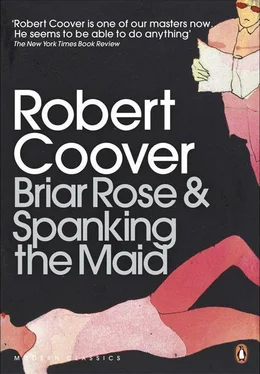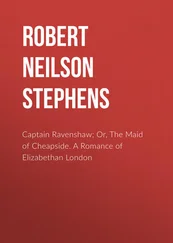Caught in the briars, but still slashing away valiantly, driven more by fear now than by vocation, he seeks to stay his panic with visions of the sleeping princess awaiting him within, as much in love with her deep repose as with any prospect of her awakening. He has imagined her in all states of dress and undress and in all shapes and complexions, spread out inertly like soft bedding on which to fall and take his ease or springing ferally to life to consume him with her wild pent-up passion, but now he thinks of her principally as a kind friend who might heal his lacerations and calm his anguished heart. It’s all right, nothing to fear, dear love, lie back down, it’s only a nightmare. Ah, would that it were so! he gasps aloud, his voice sucked up into the dense black night, his desperate heroism’s only witness. He pauses to pluck the stinging thorns snagged in his flesh and is immediately pricked by dozens more as the briar hedge, woven tight as a bird’s nest, presses up around him. He’s not even sure his feet are still on the ground so painfully is he clasped, though he still wears his boots at least, if little else of his princely raiment remains. At times he doubts there is really anyone in the castle, or that there is even a castle, those ghostly turrets glimpsed before notwithstanding. Or if there is a castle and a waiting one within, perhaps it is only the bad fairy who set this task for him and for all these dead suitors, defined their quest with her legendary spite and spindle, this clawing briar hedge the emblem of her savage temper, her gnarled and bitter soul. And even if there is a princess, is she truly the beautiful object of pure love she is alleged to be, or is she, the wicked fairy’s wicked creature, more captor than captive, more briar than blossom, such that waking her might have proven a worse fate than the one that is seemingly his, if worse than this can be imagined?
She dreams of her handsome prince, cutting his way through the torturous briars and heroically scaling the high castle walls to reach her bedside and free her from this harsh enchantment. Or perhaps she thinks of him doing so: what, in her suspended condition, is the difference? In either case, there is no residue. Always when she thinks of him, or dreams of him, it is as if for the first time, though she doubts that it can be, there being little else to fill the vast hollow spaces of her pillowed skull but such thoughts, such dreams, and though she remembers very little, she does remember remembering. Moreover, each awakening seems to be enacted against a field of possible awakenings, and how can she know what is possible, even if it is not possible, without, in some manner, remembering it? What she does remember, or believes she does, is being abandoned by her parents on her fifteenth birthday, so little did they care for her and all the omens cast upon her, leaving her once again to her own lonely explorations of the drafty old castle, explorations which have since provided the principal settings for all her dreams, or thoughts, but which on that day led her up a winding staircase to the secret room at the top of the old tower, there to meet (she remembers this) her cruel destiny. It’s not fair. Why was she the one? It was nothing bad she had done, she was famous for her goodness, if anything it was for what she’d not done, having aroused the wrath of malefic powers, envious of her goodness and her beauty, or so her ancient friend in the servery tells her now when she complains, as she has, as she’s told now, so often done. You are one of the lucky ones, the old crone says, wagging a gnarled finger at her. Your sisters were locked away in iron towers, lamed and stuck in kitchens, sent to live with savage beasts. They had their hands and feet cut off, were exiled, raped, imprisoned, reviled, monstrously deformed, turned to stone, and killed. Even worse: many of them had their dreams come true. My sisters? Yes, well, long ago. Dead now of course.
Her dreamtime moral lessons: out one ear and out the other, as the saying goes. In spite of all the fairy’s promises and reprimands, when the little ninny’s not bewailing her fate, she’s doubting it, or if not doubting, dreading it, afraid of what she longs for. It’s frustrating, she simply cannot, will not learn, and it sometimes makes the fairy, haunting too long this empty head, lose her temper, even though she knows that could she, would she, her own magical ends would surely be thwarted. That the child sometimes fears what she most desires, the fairy can appreciate, princely heroes being the generally unreliable and often beastly lot that they are, but that she doubts that her prince will ever come suggests she underestimates her own legendary beauty and its power to provoke desire in men. That such desire is a kind of bewitching (no wonder they blame it on the fairies!), the fairy knows and uses to her frequent advantage, though just how it actually works is something of a mystery to her, one of the main differences between humankind and fairies being that, for fairies, to desire something is to possess it. The nearest she can come to it is desiring desire itself so as to know the seeming pleasure got from its withheld satisfaction. She is not all-powerful, of course, and so sometimes suffers as well a certain ephemeral longing for the more absolute powers denied her, but, as a caster of spells and a manipulator of plots, the fairy understands that her talents by their very nature assume other powers and prior plots which provide the necessary arena for her transactions; it might even be said that she is empowered by the very powers she lacks, so she cannot really desire them. If, for example, in order to experience desire and its gratification firsthand, she were to try to take Rose’s place in the bed and receive her prince (unlike Rose, she can learn, would ), she knows she might lose power over her spell and either reveal herself prematurely or get trapped in her new role with no way to escape it. In a sense, omnipotence is a form of impotence. No, a stool in the servants’ quarters of this mooncalf’s head where she can sit quietly, filing her teeth, is the closest the fairy can come to witnessing desire’s strange mechanisms, or, passing fancies apart, would wish to.
She is awakened by a band of ruffians, all having a go on her lifeless body, sometimes more than one at a time. At first she believes, she doesn’t know why, that they are drunken peasants who have invaded the castle to loot it, but she soon discovers, recovering somewhat her foggy wits, that they are her father’s household knights. They seem more dead than alive, ghostly pale, drooling, their eyes rolled up, showing only the whites. They have roped her to the bedposts, there is no escape, so she leaves her struggling there and goes looking for her ancient friend in the servery, if that’s what it is, perhaps it is the great hall, or even the chapel. Oh mother, she groans, why am I the one? Because you won’t listen! cries the ill-tempered old scold, flinging the carcass of a plucked goose at her. I’m sorry, child, she says then, picking up the featherless bird and sending it flying out the oriel bay window as though to right a wrong, I didn’t mean that, I know you can’t help it, but, believe me, you should stop complaining, you are one of the lucky ones. And, poking around in her leathery old ear with a blackened claw as though to dig the story out of there (what comes out are more of those little blue lights like a swarm of sparkling nits), she tells her about a poor princess married to a wild bear who smelled so bad she had to stuff pebbles up her nose. He pawed her mercilessly and took her violently from behind and bit her when he mated and scratched her with his great horny claws. But the worst thing was his she-bear. He was married—?! Of course, you silly booby, what did you think? The old crone’s ferocious tale seems to come alive and she is lying with the stinking bear while his enraged wife snarls and bares her sharp teeth and snaps cruelly at her exposed parts. Why are the crone’s stories always about, you know, the natural processes? she asks, though she does not know why she knows this to be so, ‘always’ itself a word whose meaning eludes her. Because, grunts the bear, who seems to be trying to push another painful spindle into her from behind, she’s merely an enchantress, my love, it’s all the old hag knows.
Читать дальше












